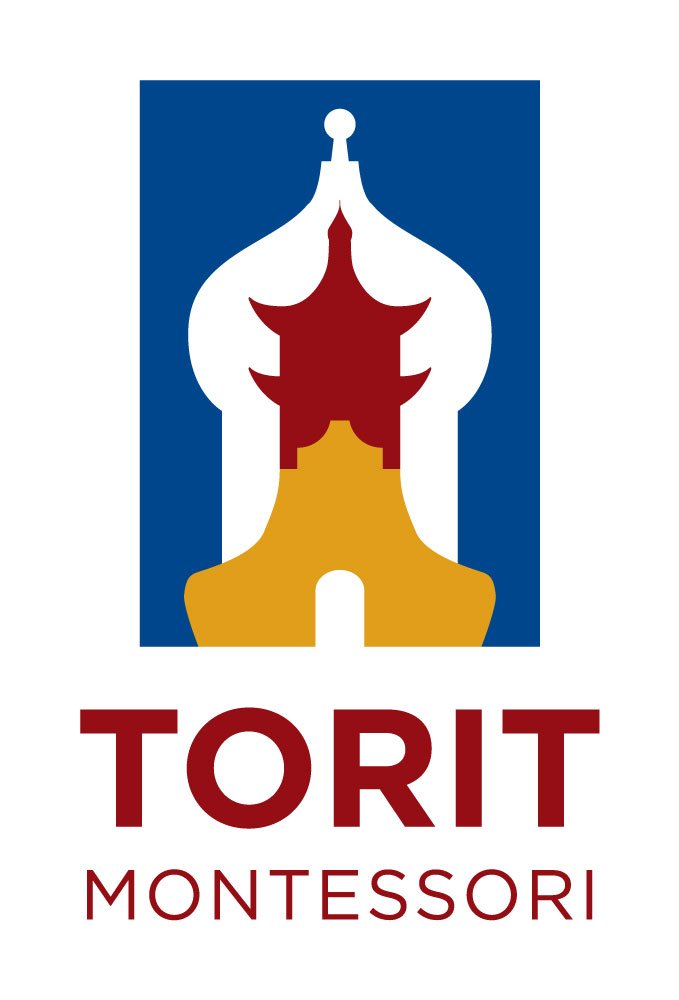What is Montessori?
A teacher presents an introductory lesson on the solar system, using fruits to compare sizes.
What is Montessori education?
According to the American Montessori Society, of which Torit is a member school:
“Montessori education is student-led and self-paced but guided, assessed, and enriched by knowledgeable and caring teachers, the leadership of their peers, and a nurturing environment.
Within the community of a multi-age classroom—designed to create natural opportunities for independence, citizenship, and accountability—children embrace multi-sensory learning and passionate inquiry. Individual students follow their own curiosity at their own pace, taking the time they need to fully understand each concept and meet individualized learning goals.
Given the freedom and support to question, probe deeply, and make connections, Montessori students grow up to be confident, enthusiastic, and self-directed learners and citizens, accountable to both themselves and their community. They think critically, work collaboratively, and act boldly and with integrity.”
Students learn a variety of academic and practical concepts using hands on materials.
How are Torit teachers trained?
In addition to a bachelor’s degree, many of our teachers hold American Montessori Society certification. This certification typically takes one to two years. Certified teachers create Montessori albums (i.e., teaching manuals for the various curricular areas); read texts and journal articles; write reports; observe students in programs; create a yearlong project; and more. Once coursework is completed, a practicum is required that includes a real-life, yearlong experience with children in a Montessori classroom. Experienced mentors guide the practicum, observing and coaching the teacher's growth as a professional.
What is the three-year cycle?
The Montessori three-year cycle affords children the opportunity to reach developmental goals in mixed-age classroom, but at their own pace. In Montessori, children typically enter a classroom as the youngest children and then stay in the same learning community with the same teachers for three years, allowing the faculty to deeply know them and support their growth.
Here a teacher demonstrates the use of geometry materials.
What is special about Montessori classroom materials, and how do children access them?
Montessori teachers spend significant time creating prepared classroom environments to maximize student learning. Materials are aesthetically pleasing and carefully chosen to support hands-on learning where students discover success through efforts that are both self-directed and teacher-supported. Students choose materials from easily accessible shelves that are regularly updated to match lessons. These Montessori materials help children move from the concrete to the abstract.
Do Montessori teachers follow a SET curriculum?
Yes! Montessori schools teach the same basic skills as public and independent schools, but with more hands-on, sensory-rich materials in a much more dynamic, integrated, and student-centered environment.
In the three-year cycle, preschool to kindergarten, there is a clear progression of learning and activities that foster academic growth and development. Most, but not all, students complete their kindergarten, or Third Year, able to read and write. This is excellent preparation for Torit’s rigorous elementary program, which integrates typical subject areas: language arts, mathematics, science, geography, social sciences, in addition to art, music, drama, and sports.
Shape matching is foundational in the process of learning to read.
WILL MY child learn what they need if they are free to choose what to work on, and workS at their own pace?
Yes! Dr. Montessori observed that children are more motivated to learn when working on something of their own choosing. When children choose an activity during work period and work at their own pace, they are working on something the teacher has demonstrated, and the student can take their time to fully absorb the lesson. In the Montessori classroom, the teacher closely observes a child’s progress and and skill set, and when that child is ready to move on to the next level, the teacher demonstrates the materials and activities. This gentle guidance helps children master the next challenge, and protects them from moving on before they’re ready. In addition, students typically set learning goals and create personal work plans with their teacher’s guidance at the Elementary level, which helps them know exactly where they are in their learning, and to take responsibility for setting and reaching personal goals.
I thought Montessori was only for preschool. Does Montessori teach Elementary, too?
Yes! Torit offers early childhood education for infants, toddlers, preschool, and kindergarten, and Elementary students Grades 1 through 6.
Dr. Maria Montessori first developed her educational approach while working with preschoolers, and gradually extended it to older children and youth.
Montessori is not for every child, though. They must be self-motivated, relatively independent, and eager to learn, and parents must support their independence and encourage them to grow and develop their skills.
Test scores and the ability to sit for a test are only part of the academic equation.
Does Torit give standardized tests?
Montessori schools use some standardized testing, but we know it doesn’t give a full picture of a child’s progress. Since many of our students go on to attend schools that rely on test scores to determine their level of mastery, we annually administer the ISEE at grade-appropriate levels to all our elementary students. Alongside this testing, we continue to evaluate our students based on the whole-child model and have rigorous standards of our own. Being able to take a test is a great skill but is certainly not the only one that matters.
Will my child EASILY TRANSITION INTO A Standard middle school environment AFTER MONTESSORI?
Yes! Montessori is a rigorous academic model that encourages independent thinking, self-motivation and self-control, exploration, leadership, and problem solving. A growing body of research shows that Montessori students do better in math and science, write more creatively, and are more socially adept than their peers from traditional schools.
Many successful graduates cite their years at Montessori schools when reflecting on important influences in their life.






